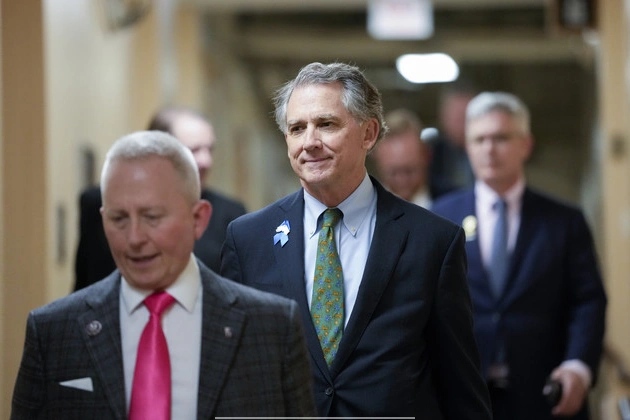
The U.S. Senate, once a pit of quicksand for industry-friendly cryptocurrency legislation, is poised to hand digital asset firms one of their biggest lobbying wins ever Tuesday afternoon.
But crypto executives may be wise to hold off on popping any champagne.
The Senate is set to vote at around 4:30 p.m. Tuesday on passing bipartisan stablecoin legislation that has been the subject of months of turbulent negotiations between Republicans and crypto-friendly Democrats. The vote will likely send the measure to the Republican-controlled House, where it will set off a new crypto policy scramble that could once again get complicated.
Key senators want House Republicans to quickly send their bill, led by Sen. Bill Hagerty (R-Tenn.), to President Donald Trump’s desk — which they say would allow Republicans to notch a major policy win in the coming weeks.
But things may not be so simple in the lower chamber, where pro-crypto Republicans including Financial Services Chair French Hill are plotting the best way to get multiple digital asset bills across the finish line this year.
Hill and House GOP leaders are weighing whether to package stablecoin legislation with an even bigger prize for the crypto industry — a separate, larger measure that would establish a regulatory framework for the broader digital assets industry. The Arkansas Republican’s so-called CLARITY Act, which a pair of House committees approved last week, has long been the crown jewel of pro-crypto lawmakers’ agenda and is a much bigger priority for most crypto firms than stablecoin legislation, which affects only a narrow subset of the digital assets world.
Hill, who has championed industry-friendly digital asset policies for years in the House, is so far keeping his cards close to his chest. Though he hasn’t explicitly said how he wants to advance the crypto bills across the floor in the lower chamber, he and his allies have made sure in recent interviews about the subject to say that lawmakers must pass both stablecoin and market structure legislation this year.
“Both these bills are very, very important to the goal of a digital asset future for the U.S.,” he said on Fox Business last week. “You can’t just pass a stablecoin bill and have any place to effectively use it. You need the CLARITY Act to give us that market framework.”
The concern pro-crypto House lawmakers have with passing the Senate bill is likely twofold.
First, House Republicans have their own stablecoin bill that the Financial Services panel approved earlier this year. Though it is similar to Hagerty’s GENIUS Act, some key differences remain — and House lawmakers don’t want to be jammed by the Senate’s product.
But more importantly, some members fear that simply passing a stablecoin bill — even if it goes through a conference committee that reconciles the differences between the two versions — would take momentum away from the broader push and leave market structure legislation by the wayside.
“The Senate clearly doesn’t … have the consensus built to deal with market structure,” said Rep. Warren Davidson (R-Ohio), a longtime crypto advocate on House Financial Services who chairs the panel’s national security subcommittee.
The “only way we get them to take action” on the House crypto proposals, he said, is to send “one, combined bill to the Senate” that includes stablecoin legislation, the House market structure bill and a measure that would ban a central bank digital currency. “I think that’s what it’s going to take to get the Senate to deal with House-based legislation,” he said, adding that he will ultimately defer to Hill.
That could create an intra-party spat with some Senate Republicans. It has taken a near-Herculean effort to get the GENIUS Act to where it is, and getting enough Democrats on board with a broader package that includes complicated market structure legislation would surely be difficult.
Hagerty, the Senate stablecoin bill’s main sponsor, said in an interview last week that his “goal is just to put a win in place for the American public and have it for the president to sign before the Fourth of July.”
“It’s very clear to me that we have an opportunity to have a great win here for the American public right now,” he said. “If the bill were to be modified [to include market structure legislation], it would have to come back to the Senate for a lot of work.”











